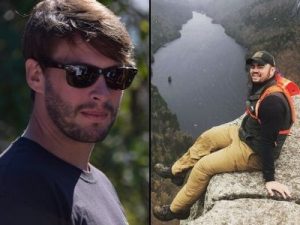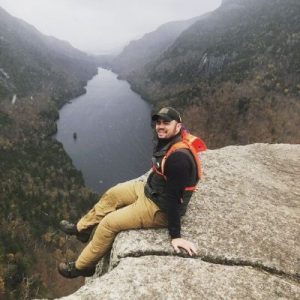 The Posse Veteran Scholars Program identifies talented veterans interested in pursuing bachelor’s degrees, and places them at top tier colleges and universities, where they receive four-year full scholarships. Each year, Wesleyan accepts a “posse” of 10 veterans. Today, on Veterans Day, we honor all U.S. military veterans by shining the spotlight on two of our own: Gabe Snashall ’21 and Michael Freiburger ’21.
The Posse Veteran Scholars Program identifies talented veterans interested in pursuing bachelor’s degrees, and places them at top tier colleges and universities, where they receive four-year full scholarships. Each year, Wesleyan accepts a “posse” of 10 veterans. Today, on Veterans Day, we honor all U.S. military veterans by shining the spotlight on two of our own: Gabe Snashall ’21 and Michael Freiburger ’21.
You’re both Posse Veterans here at Wes, class of 2021. Why did you join the military and what was your role?
Michael Freiburger (MF): I joined the Army right out of high school. I didn’t know what I wanted to do in life, and college wasn’t an option, but I knew that I needed to get out of my hometown. I spent the majority of my service at Fort Bragg North Carolina (5 years), and two years station in Germany. I deployed to Afghanistan twice and worked as an Explosive Ordnance Disposal Technician – Bomb Squad.
Gabe Snashall (GS): I joined right after graduating from High School in Fresno, California in 2011. At the time, the unemployment rate in my hometown was +18% and rising, so everybody I knew was leaving to either go to college, the peace corps, or the military. For me, the better option seemed to be a military program that offered college credit, a year or two of formal military training, and, of course, a decent amount of travel experience. Broadly speaking, I chose the military option for the opportunity to focus on and explore what I wanted to do in life, what I wanted to study, and where I wanted to go to school. I found that opportunity with the Naval Submarine Service and left my hometown a short two weeks after signing paperwork. That decision took me to Chicago for bootcamp and Connecticut for Submarine School. I was then stationed on the USS Pittsburgh (recently decommissioned) from 2011-2016, and was deployed to the Middle East, the North Pole, the Indian Sea, the Arctic Sea, and the Caribbean. In fact, I think we sailed the globe over three times while I was on board. On land, we would port in Scotland, Spain, the UAE, and Norway. On ‘The Pit’, I officially served as an Electronics Technician (ET)—specializing in satellite telecommunications, cryptographic operations, and radar and periscope maintenance. Unofficially, my peers knew me as “Snooki,” a nickname that was a reference to, and mostly making fun of, the loud and annoying way I would persuade submarine officers to accept my work requests or proposals. I won’t go into detail here, but the highly chaotic working world on a submarine brings out the most competitive side of all who work on board—so it’s an anything goes world, really.
How did you find out about the Posse Veterans program?
MF: I found out about the Posse Veterans program while I was processing out of the military. I was pretty fortunate that Posse representatives were at Fort Bragg the same week I was in mandatory exit briefs. I was lucky enough to meet with the program that week and began the process that brought me here to Wesleyan.

Gabe, you’re a government/environmental studies major. What prompted your interest in those two areas and how do you hope to tie those areas of interest together in your studies?
GS: Imagine spending eight solid months in your apartment, home, etc. with twenty of the same people always near you, and on one or two days of each month you are allowed to go outside to grab a drink at the local bar or go for a hike. The days are 18 hours long, not 24. You live in an environment in which, at times to maintain 100% sustainable operations, the creature comforts normally available do not exist i.e., potable water availability, fresh food options, and A/C. That’s what it’s like on a submarine deployment. Ultimately, for all sailors, the time on board a submarine forces them to endure what it means to exist in ways the military considers more or less sustainable. For example, when waste is processed ‘off-hull’–off of the boat, basically–it is shot off in what can essentially be understood as an underwater “waste cannon.” Every person on the boat is made well-aware of the activity of waste management because processing waste off-hull–shooting it off the boat–produces loud discharge sounds that all can hear, and vibrations that all can feel. In fact, such a great deal of internal pressure is created that sailors need to clear the pressure in their inner ear by ‘popping’ their ears for several hours after waste operations. So, I think the environmental conditions and interactions experienced from my time in the military are what attracted me to becoming an ENVS major. Because I wanted to better understand and enhance my education through major themes of resilience, stability, and sustainability, and because of my Navy experience, I found the ENVS major a natural fit. Overall, I am able to intellectually engage with my interests in environmental economics, law, and policy. Moreover, the professors and students who I engage with daily are of the type I would want to study and collaborate with, too. There’s a worldliness that I connect with in which project collaboration seems to work well.

Michael, why did you choose College of Letters—and how did you get involved in environmental studies here at Wes?
MF: I love the College of Letters, I love the material we study, and the community we have. I was drawn to the COL because I wanted to remain in a small cohort and have some classroom consistency throughout my time here. I believe that the skills I am acquiring in the COL will be transferable to any career that I may desire. Although I love learning in the COL, I want to work in the environmental sector. I have a deep longing to work outside with my hands and to feel a personal connection to my work. I think I developed this longing from my time in the military; however, this was reaffirmed after working in Arizona with Professor Helen Poulos last summer—which is when I discovered that I want to pursue a career in Forestry/Ecosystem Management.
How has your military experience shaped you and how has it impacted your experience here at Wesleyan?
GS: I would say nearly everything about my experience in the Navy prompted me to declare as a government and environmental studies major. Onboard my submarine, environmental issues were at the forefront of how we operated out at sea, with sustainability at the core of how mission planning was carried out. So I feel it was only natural for me to enroll in environmental studies courses in my freshman year.
MF: I feel that my service has given me patience, determination, and perspective, which help me persevere through adversity. These skills helped me get through the military and help me every day here at Wesleyan.
Any post-Wes plans either of you would like to share?
GS: I’m currently looking into the Yale Master’s in Environmental Management program, which is part of other joint environmental programs that are also highly interesting. That being said, I’d really like to work in sustainable governance, environmental law or management. Honestly, there are so many ways to make a positive impact in the environment, and I want to do my part with the valuable experiences I’ve gained both before Wesleyan while in the Navy and as part of the ENVS major cohort.